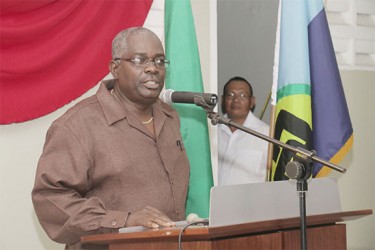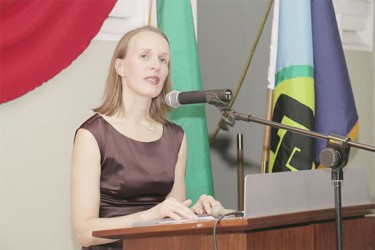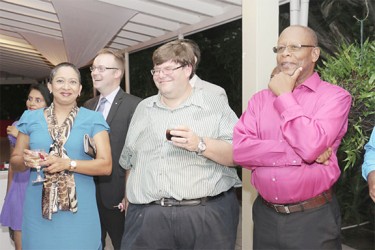Following the success of this year’s University of Guyana Student Society (UGSS) elections using automated voting machines (AVM), the Chief Election Officer (CEO) says any use here would require full consultation with stakeholders and then changes to the law.
At a cocktail reception on Saturday held in honour of the Delian Project’s Electoral Pilot for the UGSS elections, Chief Election Officer for the Guyana Elections Commission (Gecom) Keith Lowenfield stated that though the technology’s use at the university had been “satisfying” and “promising”, the use of it at local elections rested on the engagement of all relevant stakeholders.
“From all indications it seems to me from the sampling done that the system works. It works well; it’s very promising and I’m very satisfied but the decision for the commission to go or not to go with it will no doubt depend on the engagements that will no doubt occur with all stakeholders involved in Guyana,” Lowenfield said. He continued, “I am satisfied based on the observations I’ve made…that the system is workable. For it to be used in the context of Guyana it means we have to do some things that are relative in terms of our laws…Gecom is satisfied and we will deliberate further and no doubt engage all of the other stakeholders, political and otherwise, as to the way forward.”


According to Lowenfield, Gecom and Delian had been in talks for about two years after concerns were raised about elections results, especially as regards the timeliness of the declaration of results.
Lowenfield noted that all concerns of stakeholders are of concern to the commission. Therefore, he said, Gecom sought and engaged Delian to consider measures to alleviate the concerns of these groups.
The engagements, he went on, included a trip to Wakenaam, Essequibo River with the entire management team of Delian to test the technology, particularly in an area where power supply is inconsistent.
“Because if we are to operationalize Delian…then blackouts and brownouts would have to be a primary consideration. In natural environments this is what exists for determinations to what will obtain and what the outcomes will be if we do that primarily for local government elections,” Lowenfield said.
Meanwhile, Canadian High Commissioner to Guyana Nicole Giles noted the important role AVMs could play.
“From Canada to the Philippines, the use of automated ballot scan and tabulation machines has increased trust in the management of elections, improved voting security, and sped up the delivery of results,” Giles said. She went on, “When citizens are fully engaged with and participate in public decision-making, sustainable economic growth follows. As accountability and responsiveness is strengthened, so is the commitment of individual citizens to actively participate in governance. “
She further said it also creates increased space for civil society, the private sector, and other non-state actors to have their voices heard. With regard to UG, she believed that the use of AVMs will ramp up student participation.
“I am confident that this pilot will help the University of Guyana to be even more responsive to the needs of its students and to expand student engagement,” she said before continuing, “It is my hope that the success of this pilot will encourage elections officials, political parties, citizens, the private sector, civil society and academe to explore together how voter technology can be used to strengthen voter confidence, rapidly return results and increase electoral participation in Guyana.”

The Delian Project is a non-governmental organisation dedicated to helping jurisdictions implement positive change in the democratic voting process through the application of technology.





